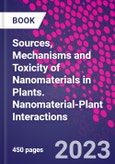Sources, Mechanisms and Toxicity of Nanomaterials in Plants discusses the plant physiology and chemistry involved when plants encounter nanoparticles. Key topics include effects of nanoparticles on photosynthetic responses, regulation of nanoparticle toxicity by nitric oxide, and regulation of nanoparticle toxicity by exogenous application of primary and secondary metabolites.
This is the first volume in the new Nanomaterials-Plant Interactions series and is an essential read to all researchers and scientists interested in plant physiology and chemistry, agronomy, nanotechnology and environmental science.
Table of Contents
1. Sources and modes of nano-pollution in the environment2. Uptake, transport and accumulation of nanoparticles in plants
3. Impact of nanoparticles on morphological attributes of plants
4. Effect of nanoparticles on photosynthetic responses
5. Nanoparticles and regulation of nitrogen metabolism in plants
6. Nanoparticles and regulation of sulfur assimilation in plants
7. Interaction of nanoparticles with establishment of symbiotic association in legumes
8. Nanoparticles and regulation of primary and secondary metabolites in plants
9. Nanoparticles and generation of reactive oxygen species and their impact on macromolecules
10. Nanoparticles and regulation of antioxidant defense system in plants
11. Interaction of nanoparticles with essential nutrients in plants
12. Regulation of nanoparticles toxicity by the nitric oxide
13. Regulation of nanoparticles toxicity by the hydrogen sulfide
14. Regulation of nanoparticles toxicity by the carbon monoxide
15. Regulation of nanoparticles toxicity by exogenous application of phytohormones
16. Regulation of nanoparticles toxicity by the amino derivative compounds
17. An appraisal on holistic plants responses under nanotoxicity
18. Impact of the physicochemical properties of nanoparticles on the interaction with plants
19. Soil factors regulating the toxicity of nanoparticles in plants
20. Nano, ionic, and micro particle toxicity: A comparative analysis
21. Evaluating the basis for the toxicity of nanoparticles derived from plant nutrients








